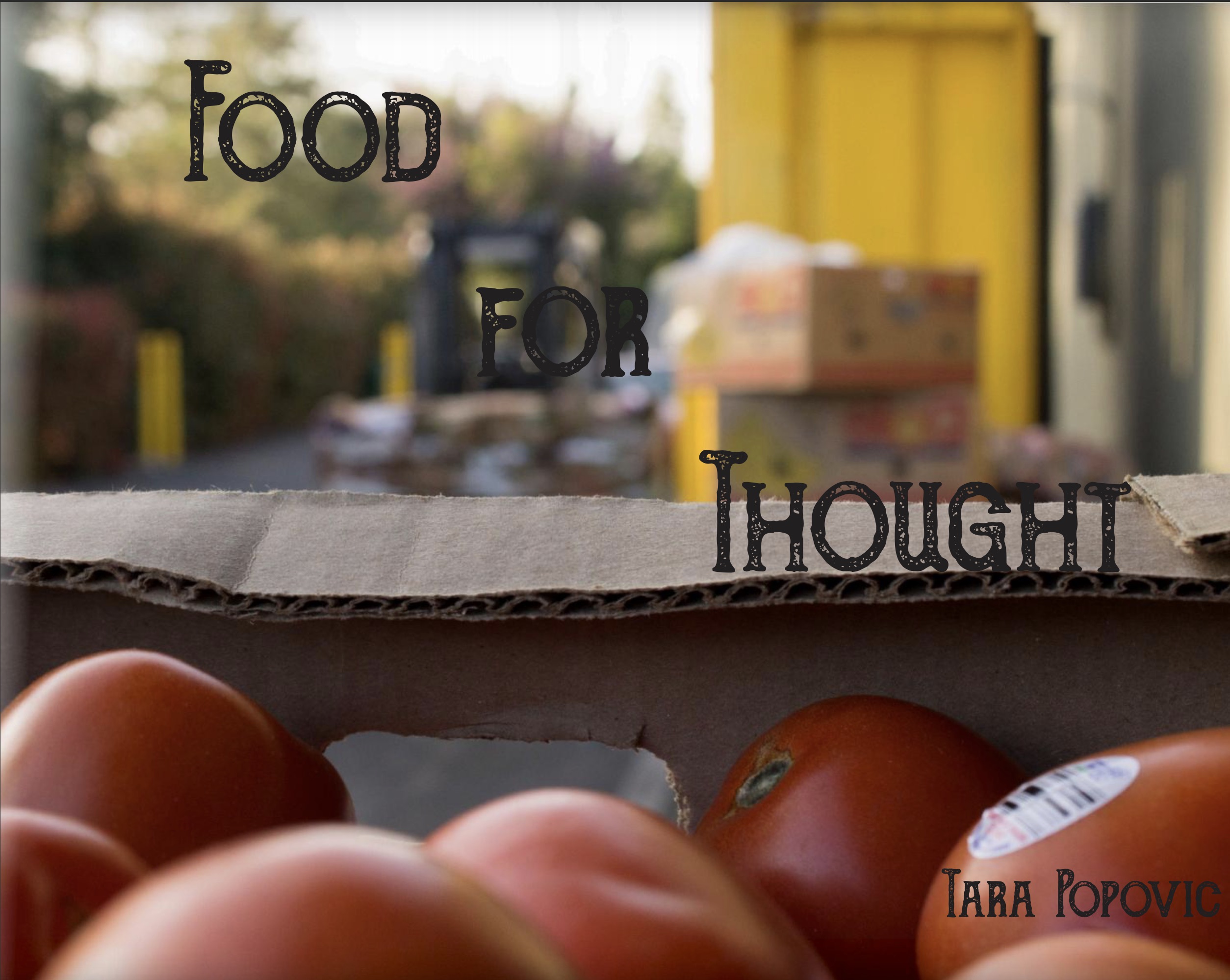Introduction
The documentary unit was the final big structured project that we did as juniors. The project connected our Freestyle skills with the outside world by requiring us to find a subject in the community and structuring all our projects around various interviews.
English: Documentary/Research Paper
In English we chose a subject to write about, did research, and conducted interviews with written transcripts. I chose to write about the politics of the food industry, as I have written before on food from the science perspective of GMO culture. My interview subject for this topic was Foothill Produce – a local artisanal produce and ethnic food store.
Expository Essay
The expository essay is a short version of the documentary paper that we wrote before writing the full paper, to help us establish our purpose and tone.
Food for Thought
As you walk down the sterile aisles of your “local” Whole Foods on your most recent spurt of healthy lifestyle inspiration, you look at the $1.49 corn cobs, the $4.00 papaya, the $14.00 shiitake mushrooms, you realize you don’t have enough money in your wallet for a meal, then stop and almost wonder out loud: How is this sustainable? What you didn’t know is that the question you just asked yourself applies not only to the store-to-consumer end of the agriculture chain, but also the grower-to-store end of the food chain. While not thought about in such a way by most people, eating is indeed a political act.
Due to the ever-present nature of agriculture in human history, its governing role and rules have evolved steadily over time both positively and negatively in terms of sustainable farming, fair labor wages, and other practices. In the U.S. today, the percentage of the population that works in agriculture is much smaller than, say, in 1900, yet the people who are working in agriculture today are working for big agricultural conglomerates that blur the lines between ethical and sustainable farming (sustainable meaning fair wages to farmers and farming methods with less chemical treatment), and severely damaging practices such as unfair labor agreements with workers, unsustainable cultivation of crops and livestock, and excessive use of chemicals on produce. Why should we care about how our food gets to our table? As author and food activist Anna Lappé puts it best in her book Grub: Ideas for an Urban Organic Kitchen, “Eating is the most essential act of every living creature. And in virtually every human culture, growing, eating, and sharing food has a spiritual dimension too. Today, eating is also unquestionably a political act. Our food choices, conscious or not, shape our world” (51).
Foothill Produce, founded in 2008, is one of three local produce – fruits and vegetables – stores in Cupertino, Sunnyvale, and Los Altos, owned by Felipe Diaz, that caters to a large and diverse set of consumers who want to be able to choose from a ripe selection of organic produce sourced from ethical and sustainable businesses without breaking the bank. The concept that we should be eating healthy is a widely accepted fact because most people understand that “nutrition and healthy eating are a good part of overall health” (Johnson), even if they don’t necessarily practice it actively. The struggle for many people is how to go about doing this. In a Stanford University project about “food insecurity” – not having a guarantee of food in one’s home – in South King County, Washington, it was discovered that 13% of adults and 22% of children were in food insecure homes. Further supporting this statistic about food insecurity, Lappé discusses in Grub a study across multiple states in the U.S. that there were “three times as many grocery stores in wealthy areas as compared with poor ones. In New York City, the wealthiest residents have five times as many square feet of grocery-store space apiece as do the city’s poorest. Adding insult to injury, grocery stores in low-income communities often jack up prices… low income residents paid 64 percent more for equivalent food…” (22). This extreme difference in store pricing based on socioeconomic level of the neighborhood might come as a shock to a lot of us, but this is actually quite normal in a society where we frequently vote with our wallets for large-scale agricultural conglomerates that are highly subsidized by the government, making significant profit, yet not putting nearly as much effort into sustainably producing and distributing their food products. This concept of voting with our wallets comes into play every time we pay for something. My specific focus is the effect of this vote on food and our agriculture environment. There are multiple reasons why we should be buying our food at local produce establishments, but two very important ones: 1) there are clear health benefits of eating produce from a market rather than pre-packaged meals from a Safeway; and 2) it is better for our economy to give our money to small local businesses rather than large chains.
To begin with, it is important to establish the basic principle that eating produce – fruits and vegetables – have an astronomically positive impact on one’s health as compared to synthetic pre-packaged instant meals. There are still people who do not understand this widely established fact – and many who do not understand the extent to which this is true. Lappé explains the scientific benefits of produce: “Researchers have been exploring the health benefits of a diet rich in fruits and veggies for a long time now and the verdict is certainly in. We also know that whether organic or not, few of us are meeting our dietary needs of whole foods. Scientists at Tufts University estimate that the average American consumes ‘less than a third of the dietary antioxidants needed to take full advantage of [their] health-promoting benefits.’” As Lappé suggests, the benefits of eating produce is not a controversial topic, as it is widely accepted that it is the way to go. Yet somehow, as Lappé also states, many people are not meeting the requirement for nutrients derived from produce. People don’t realize that when they shop at big chains that rely on industrial farming, they are making it harder for themselves to get affordable food; in fact, they are causing the economy more stress because they are paying overhead costs called “externalities” and supporting the stores, thus making it easier for them to control market prices. The industrial farming world is one that lives in a grey area funded by these aforementioned externalities – which is a fancy way to describe the economic cost that society shoulders for the actions of individuals and corporations. Lappé explains, “One estimate puts the total cost of externalities related to industrial farming in the United States in the ballpark of $6 billion to $17 billion a year” (19). If people stop using their “wallet vote” at big food corporations and buy their food at local produce stores, it might be more costly immediately but the benefit for the individual’s health reduces the net cost of that person’s life – so to speak. Additionally, the more people support local produce businesses that use sustainable practices – the more these local businesses will be in control of the economy and able to reduce prices – so we won’t have to pay these $6-17 billion externalities – and provide sustainably sourced food. Lappé sums it up best: “Our food choices build a market for certain foods, and not others. Our choices protect diversity and the health of our environment, or they help to destroy it. Our choices support certain norms of justice, or they undermine them” (73).
Design: Adobe InDesign Book
In Design, I made the paper I wrote in English into a fully produced book. I took photographs of my interviewees and the store, designed custom graphics related to my subject, and manipulated the layout in InDesign.

Film: Documentary Film
In Film I worked with Robyn Watson to video and audio record interviews – the same ones that I transcribed for my English paper and Design book. Robyn and I took the footage and audio we recorded and put together a film about the history of Foothill Produce and its impact on the community.
ARVE Error: Mode: lazyload not available (ARVE Pro not active?), switching to normal mode